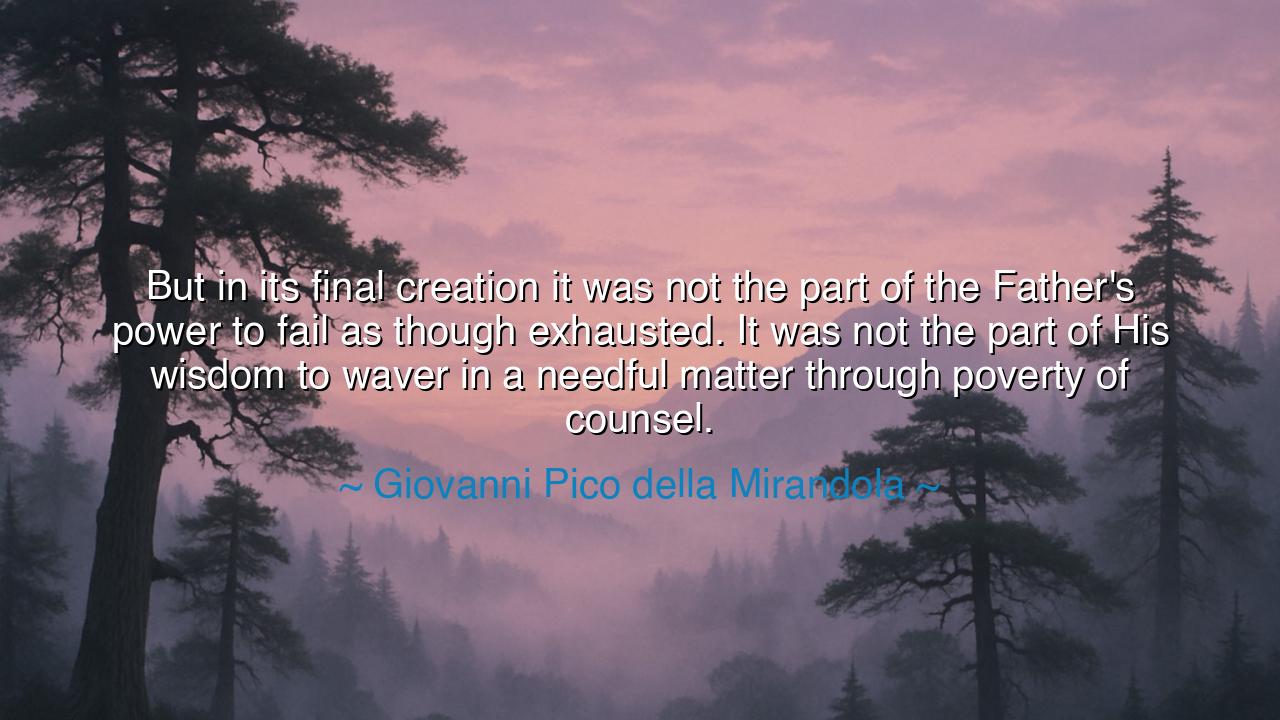
But in its final creation it was not the part of the Father's
But in its final creation it was not the part of the Father's power to fail as though exhausted. It was not the part of His wisdom to waver in a needful matter through poverty of counsel.






Hearken, O children of contemplation, to the luminous words of Giovanni Pico della Mirandola, who reflected upon the perfection of the Divine. He proclaims that in the final creation, it was not the part of the Father’s power to falter, nor the part of His wisdom to waver. In the act of bringing forth the universe, God was neither exhausted nor uncertain, for the counsel of the Almighty is inexhaustible, and His judgment flawless. Here lies a teaching for the ages: the Divine operates with boundless power and unfailing wisdom, and the works of creation bear witness to the certainty and purpose of His will.
The origin of this reflection is rooted in Pico della Mirandola’s life as a Renaissance philosopher, a seeker of universal truths and harmonizer of human and divine knowledge. In his writings, especially those exploring the nature of God and humanity, he emphasizes the perfection of divine action, contrasting it with the limitations of mortals. Pico observed that human efforts often falter, constrained by ignorance, fatigue, or indecision, yet the works of God manifest without flaw, embodying infinite foresight and strength.
The meaning of this aphorism extends to the contemplation of both creation and human endeavor. While mankind may tremble under doubt, uncertainty, or the limits of knowledge, Pico reminds us that the Divine acts with assuredness, guided by inexhaustible insight. The Father’s power is never diminished, and His wisdom never incomplete, a truth that inspires trust, awe, and the pursuit of virtue. Mortals, though finite, may seek to mirror this steadiness in their own lives, cultivating steadfastness, reflection, and purpose.
History offers reflections of this principle in the lives of the great. Consider Leonardo da Vinci, whose tireless works spanned art, anatomy, and engineering. Though mortal, he strove to emulate the perfection and wisdom he observed in nature, endeavoring to understand the divine order behind creation. His unceasing pursuit of knowledge and skill reflects the human aspiration to approach the clarity and foresight of the Almighty, even as our hands remain finite.
Moreover, this teaching invites humility and reverence. To witness the world, to study the heavens, or to craft works of thought and art, is to glimpse the perfection of divine counsel. Pico’s words remind us that human failure is natural, yet the universe’s order, the cycles of life, and the mechanisms of creation testify to a power and wisdom beyond mortal limitation. In acknowledging this, we find inspiration to strive, not with despair at our limits, but with devotion to understanding, learning, and creation.
O generations yet unborn, heed this counsel: let your hearts be attuned to the boundless power and flawless wisdom of the Divine. In creation, in thought, and in the works of your hands, strive to emulate steadfastness, clarity, and purpose. For in recognizing the perfection of the Father, we are reminded that the pursuit of knowledge, virtue, and artistry is a reflection of the eternal order, a path toward illumination and enduring wisdom.






LNLuan Nguyen
Reading this, I think about the philosophical implications of an unerring and inexhaustible divine power. Could Pico’s statement suggest that all creation is purposeful, with no risk of oversight or error? I’m curious about the tension between divine certainty and human uncertainty—how should humans interpret events that seem chaotic or unjust if God’s wisdom never falters? Does this perspective challenge us to cultivate humility and acceptance, recognizing that the full scope of divine reasoning may always exceed our comprehension?
1T12a11-Thanh Thuy
I feel inspired and challenged by this reflection on divine omnipotence. How does Pico’s assertion of flawless wisdom influence the way humans perceive creation and moral order? I’m curious whether this viewpoint supports a deterministic understanding of the universe or leaves room for contingency within creation. Could the idea that God never wavers in counsel serve as a model for humans striving for wisdom, patience, or foresight in their own decisions? It prompts reflection on the distinction between human limitation and divine perfection.
TKNguyen Tri Khang
This quote raises interesting questions about the consistency and reliability of divine action. Is Pico suggesting that God’s power is inexhaustible and cannot fail, even in the most complex or critical matters? I’m curious how this idea intersects with theological discussions about the problem of evil or suffering in the world. Does divine infallibility imply that all outcomes, even negative ones, serve a purposeful design beyond human comprehension? This perspective seems to encourage trust in divine wisdom despite apparent chaos or uncertainty.
AABCD
I find this statement thought-provoking because it highlights the contrast between divine perfection and human fallibility. Could Pico be emphasizing that while human counsel may be incomplete or uncertain, God’s wisdom operates without flaw or limitation? I wonder whether this perspective encourages humility and reflection when humans attempt to emulate or understand divine works. Does this reinforce a view of God as absolute, or does it open questions about the role of imperfection and uncertainty in the material world?
VDHuynh Vu Duong
Reading this, I feel intrigued by the assertion of God’s unerring wisdom. Does this imply that the order and design of the universe are inherently purposeful and free from error? I’m curious how Pico’s view interacts with philosophical debates about free will and predestination. If God’s counsel cannot waver, what does that mean for humanity’s capacity to shape its destiny? Could this quote serve as a reminder of the limits of human comprehension when contemplating divine matters?